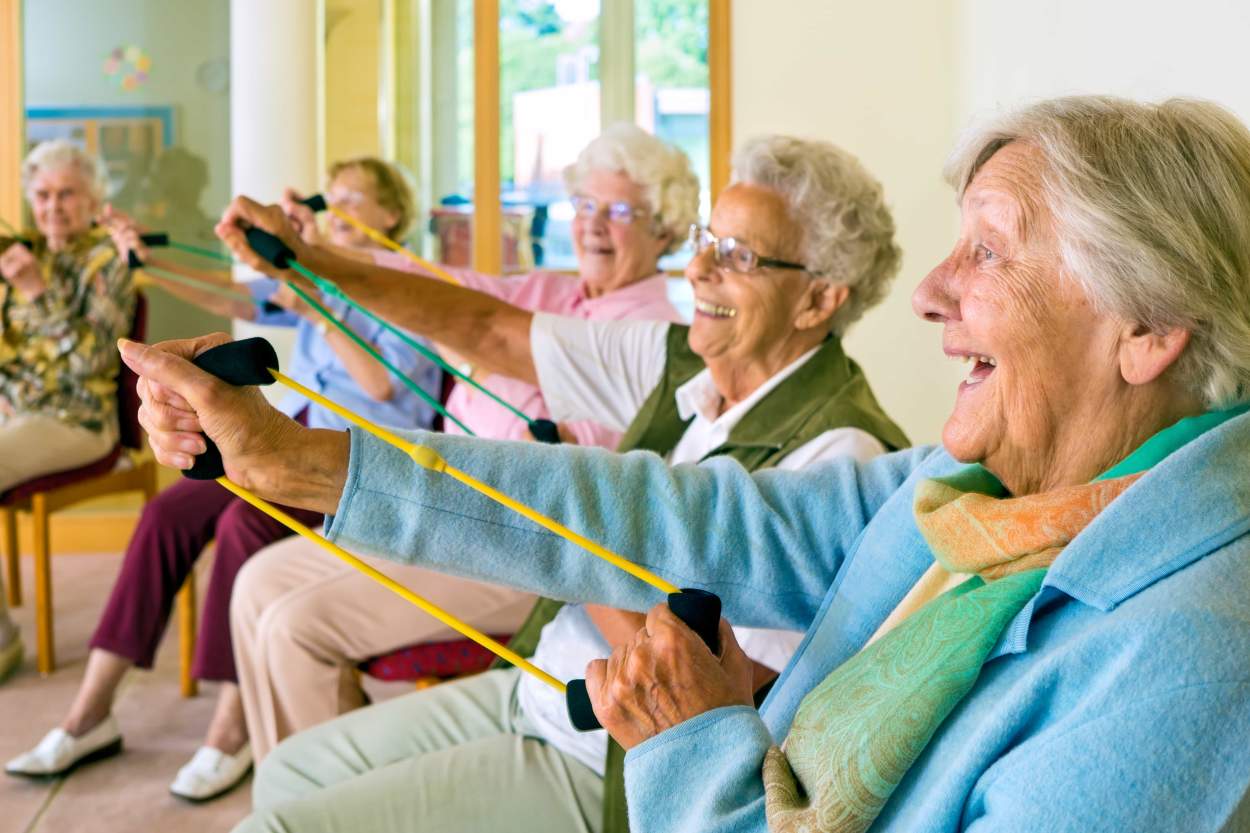ElWell’s Nancy Farmer on reversing the ‘de-conditioning’ pandemic
Tags
Living wellSocial care

Physiotherapist Nancy Farmer has over 15 years of widespread experience in both the NHS and private sector, specialising in rehabilitation for older adults, and people living with neurological needs. As well as helping clients across Oxfordshire to regain their strength, balance, and mobility, she also runs ElWell – a website offering helpful information for those looking after their parents as they grow older.
With research from Age UK revealing that 1 in 5 elderly people felt less steady on their feet after the first UK lockdown, we spoke with Nancy farmer from ElWell about the after-effects of the COVID-19 pandemic on older adults’ mobility
How has the pandemic affected older people in terms of their mobility?
When lockdown was imposed, everyone’s general activity levels went down – and for older adults for whom maintaining movement is so important to their health, the impact was clear to see.
Their everyday routines – things like doing their own shopping, attending support, exercise and interest groups, or even using communal areas in sheltered accommodation were taken away from them. It may have been that walking down for lunch in a communal area, or walking to the shop once a week were the main motivating factors for getting out of their chair.
When you take these away, the person quickly deteriorates in their ability to get out of a chair and mobilise – reducing their confidence and starting a negative reconditioning cycle.
With my clients, their care needs, on the whole, have generally increased because of this. Some have been motivated and kept up with exercises at home, but few have maintained this throughout the pandemic. While half an hour of exercise helps, it doesn’t make up for an inactive day followed by another inactive day.
Older people need to feel as though they have a purpose, and unfortunately the motivation to maintain themselves and their mobility during the pandemic has reduced this.
Has this had an emotional or mental impact on older people too?
It’s not all physical. There’s increased anxiety not only about COVID-19 itself and the impact on their families but also from life now returning to normal. Activities are resuming and people are meeting again which is increasing a general sense of anxiety – and many people have felt unable to talk to others about how they’re feeling.
There’s also been a rise in depression particularly coming out of the second lockdown where people lacked purpose, were still in isolation, or were missing loved ones.
It’s been harder for people to pick up on signs of cognitive decline when they’re not spending as much time face to face with loved ones. And, a lack of socialisation and functional practice has made this all the more difficult.
For example how safe are our loved ones driving again when they haven’t been driving during the pandemic? Can they still remember their way around the local area, and things they used to like the opening hours of shops and amenities? Have small clues been missed through not spending as much time together?
Older people who had been set up with the right technology and had IT skills before the pandemic fared better, by keeping in touch with family, shopping online, following exercise videos or joining classes, and even accessing help and support online for medical appointments.
The pandemic has also made many rethink where they live. Being closer to family has increased in importance. There is also nervousness about moving loved ones into care homes, in case another lockdown or further COVID-19 restrictions prevents them from being able to visit as freely.
While muscle mass typically declines as we age, it can be improved at any age through targeted training.
Nancy Farmer
How important is it to maintain our strength and balance as we age?
Having poor strength and balance greatly impacts our ability to do the things we want and need to do – however small they are. Strength and balance are needed for daily tasks whether it’s carrying shopping, brushing our teeth, getting out of bed, or even sitting up.
It’s paramount that we educate, and provide opportunities and advice to older people to help them maintain their strength and balance, especially in the aftermath of the past 18 months.
Having good strength and balance means that we can do these functional activities, and maintain our independence. It gives us a greater ability to engage in the community, and have fewer care needs as a result. While muscle mass typically declines as we age, it can be improved at any age through targeted training.
A lack of strength and balance is a major contributor to falls, which can really kickstart a pattern of decline for an older person. This is why fall prevention and intervention programmes are so important to not only reduce the likelihood of them happening but also the longer-term impact of a fall. Falls are multifactorial and there are likely to be several contributing factors, many of which can be addressed, for example with vision and eye tests, appropriate glasses, removing environmental hazards, and providing support for poor balance.
Fear of falling can be very limiting for someone – preventing them from going out or even doing certain things within their own home, such as taking a shower. Our ability to do things is part of what determines who we are and what roles we take on in life, so when this changes people can really struggle.
This fear can mean the parent and child roles can sometimes reverse as we grow older and lose confidence. A parent may feel unable to do things like look after their grandchildren or cook lunch, and can often start to feel isolated, or worry about becoming an emotional or financial burden on their families.
How can we all improve our mobility as we get older?
Advice, education, and talking openly about difficulties as we age are important here. It’s about helping people to realise that there are really positive changes that they can make to help maintain their function. This is part of what we do at ElWell. By supporting carers and people with ageing parents, we hope to inspire and help them to make meaningful change – not just for their parents but to be more aware of their own health and abilities in the future.
For an older person themselves, they need to be motivated and willing to try different approaches and activities. Those around them should take care to ensure they’re not taking away their independence through kindness. Wherever possible carers should encourage their clients or loved ones to do as much for themselves as possible, to shift their minds from ‘I can’t do it’.
Exercise and activity levels, which are obviously close to my heart as a physio, have a big role to play in maintaining mobility. The many wide-ranging benefits are well documented, from maintaining independence, reducing falls, reducing depression and anxiety, to reducing the incidence of preventable diseases.
Exercise programmes where possible should be tailored, and activities should be enjoyable and safely accessible. Exercises can still be varied too – from exercises programmes at home and virtual classes to local groups, walking groups, targeted activities, and those held within rehabilitation facilities.
An older person may choose just one or a combination of these, depending on whichever suits them best. When supporting an older person, remember to start small and work your way up – every minute of exercise counts. Setting even small goals is important to keep up the motivation and make the process meaningful.
I’m a big advocate of daily living aids. Ranging from kitchen gadgets through to walking aids, they really increase independence and can help to give people a purpose again. Suddenly they can get around more easily, attend the group they’ve been missing out on, or just find life that little bit easier. This then opens up the world of social opportunities more. If you’re not sure what social options are available for your own loved ones, encourage them to speak with their GP about social prescribing and they can signpost them to things of interest.
On the whole, housing often isn’t as accessible for us as we age – according to research from the Centre for Ageing Better, over 60% of people don’t think their home would be suitable for an older relative to move around safely in. That’s why environmental assessments are so important. We need to take a view of our loved ones’ accommodation, how they use it and want to use it, and any future hazards. Adaptations big and small can then be implemented which helps them to move around more easily in their home and reduce the risk of falls in older people.
Read our latest interviews
Browse our latest interviews, and research on elderly living, from leading national experts.